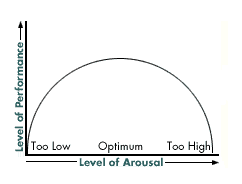
WORK-LIFE BALANCE: SETTING BOUNDARIES AND LIMITS
Do you feel you have a good balance between work and life?
Pinball machines have a terrific way of demanding respect. If players push them around too much, they go "TILT" and shut down. No second chances. That's a pretty impressive way of setting limits on the amount of abuse they're willing to take. When it comes to work-life balance we also need to set limits to protect ourselves. We could use the word, "TILT," but I have another suggestion.
When I was in general practice and reached a critical mass of patients to see, phone calls to return, and paperwork to deal with, the word that flashed through my mind was, "ENOUGH" -- like a big neon sign. I'd pause, sit down with my nurse and start delegating like crazy--finally making decisions I had been putting off for days. The pile of charts on my desk would fade within minutes, leaving me a manageable workload again, and a great sense of relief.
ENOUGH is another word we should add to our work-life balance vocabulary. The work day is getting longer and faster and more open-ended. To get control of this situation we need to start asking, "How much is enough?" How much is enough time spent at work? How much is enough achievement and success? How much is enough money?
Let me share three stories. A friend of mine was lamenting his overload of work. A self-employed professional, he was inundated with clients, paper, phone calls and faxes, and plagued by constant deadlines. His work often spilled over into his evenings and weekends. He said he had no choice because there was all this stuff to do. I asked: "What do you mean you have no choice? Why did you take on so many clients in the first place?" He said, "Hmm, I see what you mean. I guess I did have a choice."
In the second case, a patient recounted a whirlwind trip to Chicago to finalize a business deal. He put in several 18-20 hour days with a large team of lawyers, accountants, and business people before finally dragging himself home, utterly exhausted. I asked him what was the compelling urgency that had all these people working around the clock to complete this transaction? He said, "That's just the way they do business there." And then he said, "If you want to know the worst of it, after I left, they were already revving up for another marathon session to close the next deal. For them, it never stops."
The next story involves a person who only got home for dinner a couple of nights a week. In addition to his full-time job, he volunteered his time to five community organizations. A nicer guy you couldn't find, but he was pulling himself in so many directions that he barely had time for his family.
To all of these people I asked two questions: "Why are you doing this?" and "How much is enough?" Too many of us are on overload. I think that people who work long hours are fooling themselves. Very few people can put in more than 10 hours a day (or 50 hours a week) and still be productive. After that, not only does everything take longer, but we become tired and inefficient.
This is illustrated by the classic Yerkes Dodson Curve (see diagram below), which shows the relationship between performance and stress.
Yerkes Dodson Curve

In the first part of the curve, stress actually improves our efficiency. But past a certain point, the reverse occurs: ongoing stress impairs our effectiveness. In fact, working longer or harder beyond that point is not only unproductive, it's counter-productive. We might even call this the law of diminishing returns. Our bodies and minds need recovery time to restore us to full function.
Instead of peddling harder and faster, the best approach is to avoid the down side of the curve altogether. This is where setting boundaries and limits is most useful.
Here are some parameters I use to maintain efficiency in my work, and balance in my life:
1. I usually work from 8:00 a.m. to 6:00 p.m. with time for lunch and an exercise break in the afternoon.
2. I work only a few evenings a month.
3. I rarely work on weekends.
4. I almost never do business travel on Saturday or Sunday.
5. I rarely go out more than two evenings in a row, even socially or to play sports.
These are boundaries I've established over the years. They're not hard and fast, but I don't violate them very often. What works for one person may not work for another, but these are examples of guidelines that you can set in your own life depending on your circumstances.
You can also establish boundaries by location. For example:
1. Don't do work at home.
2. If you do work at home, limit yourself to only one room or place in the house.
Whatever the specifics you decide on, the important thing is to fix some kind of limits. Ask yourself "How much is enough?" (work, income, success) and set boundaries accordingly. You need to know what your limits are regarding energy and productivity. Then you need to say, "ENOUGH" before your body goes "TILT."
All material copyrighted, David B. Posen M.D. |